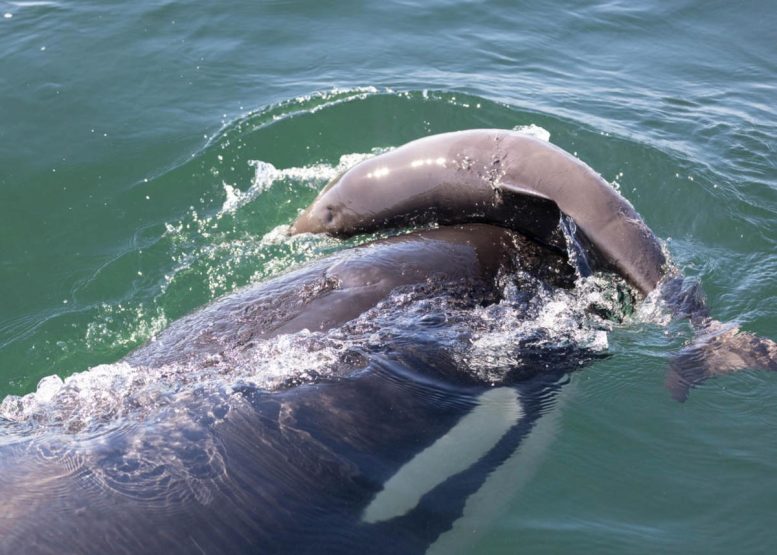
A killer whale in the Salish Sea is observed harassing a porpoise, a behavior that has long perplexed scientists. A study from Wild Orca and UC Davis’ SeaDoc Society investigates what may be behind it. Credit: Wild Orca
Scientists investigate a perplexing behavior.
For many years, scientists have been puzzled by the behavior of Pacific Northwest fish-eating killer whales, who have been seen harassing and sometimes killing porpoises without eating them.
A study recently published in Marine Mammal Science, co-led by Deborah Giles of Wild Orca and Sarah Teman of the SeaDoc Society, a program of the UC Davis School of Veterinary Medicine, looked at more than 60 years of recorded interactions between Southern Resident killer whales and porpoises in the Salish Sea to better understand why they exhibit this behavior.
Southern Resident killer whales are an endangered population, numbering only 75 individuals. Their survival is intimately tied to the fortunes of Chinook salmon — also an endangered species. Without enough Chinook salmon, these whales are in danger of extinction.
“I am frequently asked, why don’t the Southern Residents just eat seals or porpoises instead?” said Giles. “It’s because fish-eating killer whales have a completely different ecology and culture from orcas that eat marine mammals — even though the two populations live in the same waters. So we must conclude that their interactions with porpoises serve a different purpose, but this purpose has only been speculation until now.”
Three plausible explanations
While scientists have recorded instances of Southern Resident killer whales engaging in porpoise harassment as early as 1962, reasons for this behavior have long remained a mystery. Giles, Teman, and a team of collaborators analyzed 78 documented incidents of porpoise harassment from 1962 to 2020. The study suggests three plausible explanations:
- Social play: Porpoise harassment may be a form of social play for killer whales. Like many intelligent species, these whales sometimes engage in playful activities to bond, communicate, or simply enjoy themselves. This behavior might benefit group coordination and teamwork.
- Hunting practice: Another hypothesis suggests that porpoise harassment might hone their salmon-hunting skills. Southern Resident killer whales could view porpoises as moving targets to practice their hunting techniques, even if they do not intend to consume them.
- Mismothering behavior: This theory suggests that the whales may be attempting to provide care for porpoises they perceive as weaker or ill–a manifestation of their natural inclination to assist others in their group. Females have been witnessed carrying their deceased calves and have been seen similarly carrying porpoises.
“Mismothering behavior — also known as ‘displaced epimeletic behavior’ to scientists— might be due to their limited opportunities to care for young,” Giles explained. “Our research has shown that due to malnutrition, nearly 70% of Southern Resident killer whale pregnancies have resulted in miscarriages or calves that died right away after birth.”
Salmon specialists
Despite these intriguing insights, Giles, Teman, and their collaborators acknowledge that the exact reason behind porpoise harassment may never be fully understood. What is clear, however, is that porpoises are not a part of the Southern Resident killer whale diet. Southern Resident killer whale diets are highly specialized for salmon, making the idea of eating porpoises highly unlikely.
“Killer whales are incredibly complex and intelligent animals. We found that porpoise-harassing behavior has been passed on through generations and across social groupings. It’s an amazing example of killer whale culture,” Teman says. “Still, we don’t expect the Southern Resident killer whales to start eating porpoises. The culture of eating salmon is deeply ingrained in Southern Resident society. These whales need healthy salmon populations to survive.”
This research underscores the importance of conserving salmon populations in the Salish Sea and throughout the whales’ entire range. Maintaining an adequate supply of salmon is vital for the survival and well-being of Southern Resident killer whales and the overall health of the Salish Sea ecosystem.
Affinity for play
This study comes at a time when a separate population of killer whales on the Iberian Peninsula has drawn international headlines for interacting with, and on three occasions, sinking boats off the coast of Portugal and Spain. Ultimately, the Southern Resident killer whales and the Iberian Peninsula orcas are two different populations with distinct cultures. One thing the two might have in common is their affinity for play behavior.
Reference: “Harassment and killing of porpoises (“phocoenacide”) by fish-eating Southern Resident killer whales (Orcinus orca)” by Deborah A. Giles, Sarah J. Teman, Samuel Ellis, John K. B. Ford, Monika W. Shields, M. Bradley Hanson, Candice K. Emmons, Paul E. Cottrell, Robin W. Baird, Richard W. Osborne, Michael Weiss, David K. Ellifrit, Jennifer K. Olson, Jared R. Towers, Graeme Ellis, Dena Matkin, Courtney E. Smith, Stephen A. Raverty, Stephanie A. Norman and Joseph K. Gaydos, 28 September 2023, Marine Mammal Science.
DOI: 10.1111/mms.13073
The study was funded by Wild Orca and SeaDoc Society. Additional partners include the University of Exeter, Fisheries and Oceans Canada, Orca Behavior Institute, National Oceanic and Atmospheric Administration, Cascadia Research, The Whale Museum, Center for Whale Research, Ocean Research College Academy (ORCA) at Everett Community College, Bay Cetology, North Gulf Oceanic Society, George Mason University, and Marine-Med.









There’s infinite possibilities. Maybe they’re annoying. Maybe their clicking and buzzing echolocation noises are unpleasant. Maybe they don’t understand orca noises and are in the way. Maybe they potentially carry diseases. Maybe orcas are jerks. Maybe the porpoises said unkind things about Free Willy.
Or just maybe, they both eat salmon, and compete for the same food source in the same territory.
Summer 1979 to summer 1980, the San Diego Sea World put recent captive orcas (Icelandic) in the dolphin petting pool. There were mostly bottle nose dolphins, some Pacific white sides, and a pilot whale in the pool.
Initially they put orcas in the pool one at a time. The dolphins attacked the orca. When they put 2 orcas in the pool, the orcas could successfully defend themselves against dolphin attack. Orcas and dolphins ended up “calling a truce”. The attacks stopped.
I was interacting with a dolphin, when an orca made a stealth approach and surfaced from beneath the dolphin. The orca sent the dolphin flying backwards thru the air with a flick of his head. He slid between my hands where the dolphin had been. (My 1st meeting with an orca.) Clearly the orcas still didn’t particularly respect the dolphins.
My experience was that the orcas rather assertively sought my friendship. After this 1st orca and I had interacted, all the other orcas recognized me by sight and would come right to me whenever I visited. The orcas involved, in the order I met them were: Canuck 2, Kotar, Kasatka, and Katina. It’s possible that Kandu 5 had originally been one of these orcas.
[Perhaps some 2 dozen visitors formed friendships with these orcas. A couple of us published a peer-reviewed paper on orca behavior as observed from the context of human-orca friendship. Animals 2016, 6(8), 49; https://doi.org/10.3390/ani6080049%5D
It could also be for the same reason that African lions will, given the opportunity, kill competing competitors of all species, including their own, and not eat them. Killing a couple of leopard kittens reduces future competition.
That should have been “competing predators.”